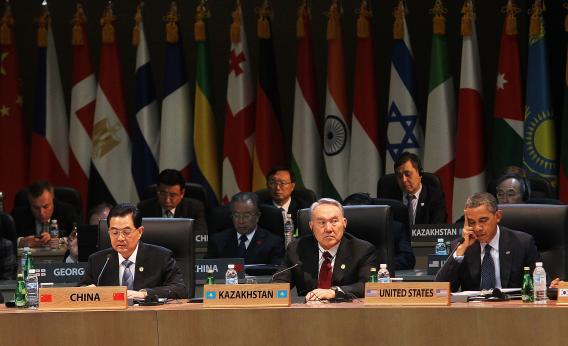David Graeber does the world a great service by erroneously insisting that the present-day use of the U.S. dollar as a reserve currency reflects the coercive use of American military might. He’s wrong, but the points he makes help to usefully counterbalance an alternative wrong view that tends to pass for conventional wisdom in which China is portrayed as “stealing jobs” through “currency manipulation.” The entry into the argument is that several of Graeber’s critics have observed that his view on the dollar’s role seems undercut by the fact that the main foreign purchaser of U.S. debt isn’t a client state like Israel or a member of our sphere of influence like Mexico or a long-standing ally like the United Kingdom or a country we recently conquered like Iraq. It’s China, one of the countries that faces the least objective military threat from the United States.
The important point Graeber is making is to emphasize that what’s going on certainly looks a lot like a tribute relationship. Behind the veil of currency pegs and treasury purchases, what’s happening is that China sends a lot of manufactured goods to the United States at a discount. They get some stuff in return from us, but it’s much less valuable than what they send. If the flow went in the other direction, that might make sense. We could be doing China a favor, offering charity to a substantially poorer country. Or it could be an investment. Since China is poorer than the United States, perhaps we expect it to grow faster over the long term so Americans want to send goods to China in exchange for ownership claims on future Chinese production. But neither of those things is happening. If it’s not tribute, what is it?
The answer is that it’s neither craven tribute nor canny job-stealing, but development strategy. Because land is such an important factor of production in agriculture, a poor country with a primarily agricultural workforce can do a great deal to improve its labor productivity by shifting people off farms and into factories. The factory workers will be more productive than the farmers, but the remaining farmers will also see their labor productivity rise because with fewer people in the village there’s more and better land available for each farmer to use.
This turns out to be a moderately difficult thing to pull off. One approach is the American Hamilton/Clay/Lincoln development strategy of using high tariffs to finance infrastructure and opening the doors to mass immigration. Rather than buying goods from Europe, European workers came to the 19th-century United States. Another approach is the Soviet strategy of confiscating agricultural surplus from the peasants and using that to finance industrialization. China attempted to emulate the Soviet strategy in the postwar years, but somehow their implementation of it went much worse. They got Soviet-style famines without anything approaching Soviet levels of industrial capacity (note that even today Russia is much richer than China). The strategy America used of taxing imports to finance domestic infrastructure is depreciated under the current rules of the world economic game. But buying dollar-denominated financial assets has a similar impact. It reduces the real incomes of Chinese agriculturalists and rewards the owners of Chinese factories and, to an extent, their workers. Since we had voting and elections in the United States, we can easily see that this was a contestible and contested policy choice that agricultural interests resisted (at times successfully) with the outcome determined to an extent by whether the industrial workforce saw its interests as aligned with the factory owners (as in Bryant vs. McKinley) or with the farmers (as in Hoover vs. Roosevelt). America’s policy choices in this regard had an indirect impact on the lives of Europeans, but they were very much driven by domestic American factors and the balance of political power in Congress. China’s version of this has a somewhat different formal structure but is fundamentally the same.
The problem for the United States, meanwhile, is that we haven’t responded to this opportunity very well. Rather than plow the People’s Bank of China’s gift to the American people into useful projects that boost America’s long-term living standards, we spent the aughts cutting taxes and financing an extravagant military budget that doesn’t bring us any useful tribute as its reward.
